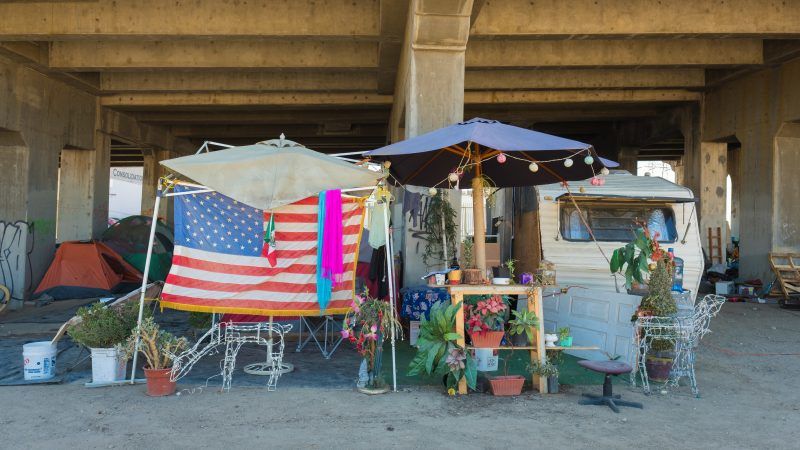Denver Ballot Initiative Would Guarantee Your Right To Sleep in Your Car
Initiative 300 takes aim at the city's incredibly broad anti-camping ordinance

When voters in Denver head to the polls next week for municipal elections, they'll be asked to decide on a ballot measure that would guarantee people a right to sleep in public places. The target of Initiative 300 is the city's incredibly broad anti-camping ordinance that advocates say has effectively criminalized homelessness in the city.
Passed in 2012, Denver's anti-camping ordinance makes it unlawful to camp on any public property unless camping is expressly permitted. However, what counts as camping includes a lot more than pitching a tent.
Under the law, any person dwelling temporarily in a place with shelter and conducting "activities of daily living," like sleeping, eating, or storing personal belongings, is camping and therefore breaking the law. Shelter, too, is defined quite broadly as using any form of cover from the elements except clothing.
The camping ordinance includes explicit provisions that limit the ability of police to arrest or ticket people for camping, directing them instead to issue a warning and to offer medical help if needed. Nevertheless, advocates argue that constantly moving the homeless away from public places is disruptive for people already struggling.
"Police use that law to push people away. They sweep them, and then they confiscate property like blankets or sleeping bags," Raffi Mercuri, the campaign manager of the Yes on 300 campaign, tells Reason. "What happens in sweeps is that communities get disrupted. People get isolated."
Initiative 300 would put a stop to this by affirmatively guaranteeing people a right to rest in accessible, outdoor public places. Blocking sidewalks or other public rights-of-way would still be prohibited by the ordinance.
The measure would also guarantee people a right to sleep in their car (provided it's legally parked), and to share food in public.
In addition to freeing the homeless from disruptive sweeps and the confiscation of their belongings, Mercuri says that the ordinance would help social workers trying to provide services to them.
"If you allow people to remain in one place, people can keep track of where they are and can get them on track to get out of that situation," he says.
In addition to a coalition of Denver homeless advocates, led by the group Denver Homeless Out Loud, the initiative has the support of Colorado's ACLU chapter.
Fighting the initiative is the city's business community, which argues that the measure is overly broad and potentially damaging to public safety and the city's image.
Initiative 300 "undermines public safety and the well-being of all Denver residents, including those experiencing homelessness, by preventing the enforcement of essential public safety laws," reads a statement from the Downtown Denver Partnership, a business group.
The Downtown Denver Partnership has given $200,000 to the No campaign, as has the National Association of Realtors. All told, opponents have spent $1.5 million fighting Initiative 300, compared to the Yes side's paltry $80,000.
They have also circulated a report arguing, in part, that the initiative could be detrimental to Denver's ability to attract conventions and other large events.
Some homeless advocates, while denouncing the No side for fear-mongering about the homeless, have also criticized the measure, arguing that it would essentially codify an unacceptable status quo.
"We are concerned that if the initiative becomes law, it will lower the prevailing standard of human welfare in our community potentially reducing the expectation of 'need' met by our human service organizations, community members and government. Instead, the focus will be sheer physical survival in outdoor spaces that are not suitable for human habitation," said the city's Homeless Leadership Council in a March statement.
Yet, the argument that the homeless will need subsequent support seems beside the point when considering the question of whether it should be illegal for them to sleep outside or cover themselves with a blanket.
And while concerns about preserving public places are understandable, the libertarian solution would seem to be privatizing things like parks and letting the owners set rules for their use.
It certainly seems like a much better idea than using the police to chase the homeless away from public spaces that are supposed to open to everybody.
Rent Free is a weekly newsletter from Christian Britschgi on urbanism and the fight for less regulation, more housing, more property rights, and more freedom in America's cities.


Show Comments (10)